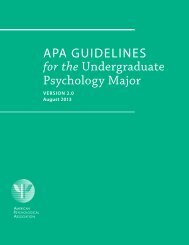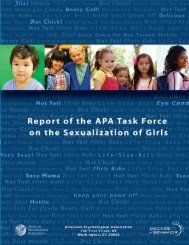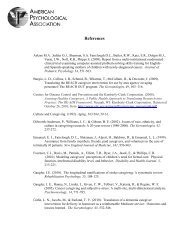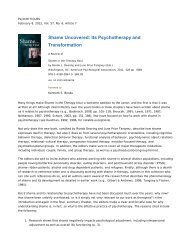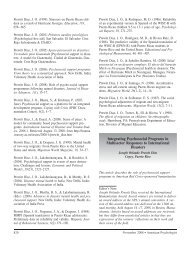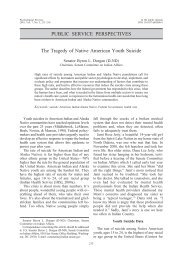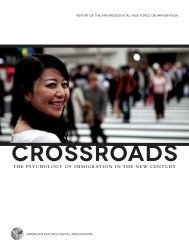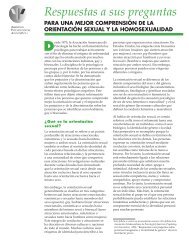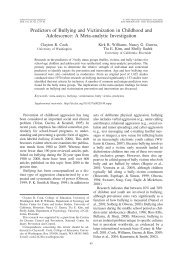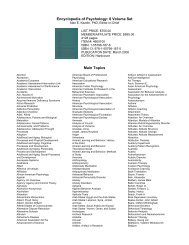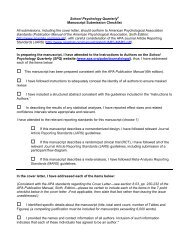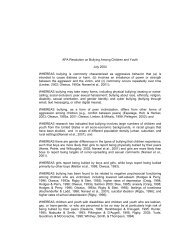James McKeen Cattell, Nicholas Murray Butler, and Academic ...
James McKeen Cattell, Nicholas Murray Butler, and Academic ...
James McKeen Cattell, Nicholas Murray Butler, and Academic ...
Create successful ePaper yourself
Turn your PDF publications into a flip-book with our unique Google optimized e-Paper software.
94 SOKAL<br />
Harvard, Yale, Chicago, <strong>and</strong> Johns Hopkins, <strong>and</strong> [we] are in danger of falling<br />
behind lesser institutions.” He criticized <strong>Butler</strong>’s leadership <strong>and</strong> blamed this<br />
decline largely on “the bureaucratic system by which nearly everything is done by<br />
the president with or without consultation,” a practice that he said discouraged<br />
“able <strong>and</strong> independent men” <strong>and</strong> described as “subversive to academic freedom.”<br />
<strong>Cattell</strong> cited data based on membership in the National Academy of Sciences to<br />
support his claim. However, this memo seems to have attracted little faculty<br />
support, <strong>and</strong> <strong>Butler</strong> apparently took little immediate notice of it.<br />
About a month later, the eminent Columbia Latinist Harry Thurston Peck was<br />
sued by a female former employee for breach of promise. New York tabloids soon<br />
printed Peck’s flirtatious letters <strong>and</strong> soon thereafter the university dismissed<br />
him. 66 Peck denied the charges, <strong>and</strong> <strong>Cattell</strong> leapt to his defense, 67 <strong>and</strong> he<br />
denounced <strong>Butler</strong>’s authoritarian action <strong>and</strong> the injustice of dismissing an apparently<br />
innocent man. It gradually became clear, however, that Peck did write the<br />
letters in question <strong>and</strong> <strong>Cattell</strong>—always devoted to the integrity of families—<br />
withdrew his support. 68 But Peck soon opened a public counterattack. He publicly<br />
denouncing <strong>Butler</strong>’s autocracy, <strong>and</strong>, in claiming to be part of Columbia’s “insurgent”<br />
faction, cited specifics from <strong>Cattell</strong>’s “Memor<strong>and</strong>um.” Soon thereafter, New<br />
York newspapers—both tabloid <strong>and</strong> broadsheet—published long excerpts from<br />
this document. 69 The details of the <strong>Cattell</strong>’s attacks on <strong>Butler</strong> thus became public,<br />
<strong>and</strong> their dispute reached a new level.<br />
<strong>Cattell</strong> claimed that the public disclosure of his memo embarrassed him as<br />
much as it did <strong>Butler</strong> <strong>and</strong> Columbia 70 But his actions the following November<br />
suggest otherwise. <strong>Cattell</strong> then published both the second edition of American<br />
Men of Science <strong>and</strong> his statistical analyses of its data, 71 based on the eminence<br />
ratings of those included in the volume. In the 1906 first edition, <strong>Cattell</strong> starred the<br />
entries of the 1,000 most highly rated scientists, <strong>and</strong> in 1910 he compared the<br />
traits of newly “starred” scientists with the 1906 cohort. He stressed their<br />
geographical <strong>and</strong> institutional distribution, <strong>and</strong> thus presented what have been<br />
called the first published quality ratings of American universities. 72 In addition, he<br />
used these data to attack <strong>Butler</strong>’s presidency, arguing that “Columbia <strong>and</strong> California,<br />
in which faculty control is regarded . . . as less important than executive<br />
efficiency, have suffered the most serious losses, whereas Harvard <strong>and</strong> Yale,<br />
where the methods of appointment <strong>and</strong> promotion are more democratic, show<br />
most gratifying advances” (p. 677). Privately, other Columbia professors spoke<br />
well of his analyses. 73 More publicly, however, press attention to these claims<br />
soon swamped even that paid to the salacious aspects of Peck’s case, as the New<br />
York press highlighted <strong>Cattell</strong>’s criticisms of Columbia 74 <strong>and</strong> newspapers <strong>and</strong><br />
alumni magazines throughout the country used these results to brag about highly<br />
rated universities <strong>and</strong> to condemn leaders of poorly rated institutions. 75<br />
Matters escalated still further early in 1911, when <strong>Butler</strong> arbitrarily dismissed<br />
Joel E. Spingarn, a Professor of Comparative Literature, <strong>and</strong> later an important<br />
figure in the history of the NAACP. 76 Spingarn had resisted plans to merge his<br />
area into the Department of English, <strong>and</strong> his opposition had long alienated many<br />
of his colleagues. In March 1911, <strong>Cattell</strong> brought his campaign against <strong>Butler</strong> to<br />
a new level, <strong>and</strong> moved at a faculty meeting that his colleagues examine the<br />
“manner of appointment” of professors. 77 <strong>Cattell</strong>’s motion lost, as English professors<br />
rallied to protect their turf. But the New York press again gave much



